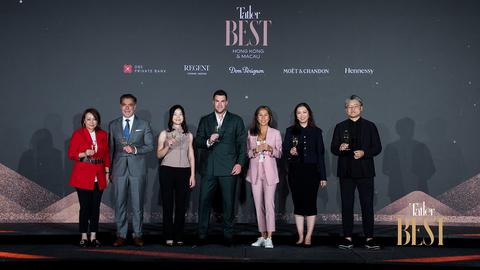Analyses & Studies • Sectors & markets • Foresight • Publications
HongKongEcho: What makes Impact a game-changer for university research?

Thirty law professors walk into a series of design thinking workshops. No, it’s not the lead-in to a punchline, but rather a potential game-changer for bringing research into the real world.
“Universities need to innovate by reaching outside their own walls and being relevant to the real world,” says Antoine Martin. That’s a challenging assertion for Hong Kong and its prestigious, world-renowned universities.
Martin is Head of Impact at the Law Faculty of the Chinese University of Hong Kong, a role that sounds closer to the buzzword-laden world of startups and venture capitalists than academia – and that’s precisely the point.
 |
| The business world and academics can be brought closer, says Martin |
The idea of ‘Impact’, Martin explains, originated in the United Kingdom in 2014. There, legislators wanted a clearer understanding of how taxpayer money being ploughed into research was creating an actual impact on society.
“For universities, it’s about building leadership. Publishing sharp insights that actually make their way into the world instead of sitting on a private database accessed only by other universities or a handful of firms,” he says.
Out of the comfort zone
About two years ago, Hong Kong’s government decided to follow suit. It provided the cash to the city’s top universities and charged them with making an impact of their own. “What they didn’t do was provide the framework. We knew we had to reach outside of academia to bridge the gap with the real world, but beyond that there was very little direction.”
All faculties were obliged to appoint an Impact coordinator – in addition to their normal workload. CUHK’s Law Faculty took a different approach, appointing Martin to develop their strategy in a dedicated role. “I’d been mingling and meeting with entrepreneurs, startups and businesspeople in the FinTech world for the previous two years, so it made sense.”
The first step? Invite some of those outsiders into the faculty to work with professors on how they could best communicate their research to the world.
Design thinking workshops with post-its and rapid ideation is hardly what you expect to see in a Law Faculty, but it’s exactly the kind of entrepreneurial mindset that is needed according to Martin.
 |
| Strong leadership is needed if Impact is to take hold, according to Martin |
“We wanted to take the professors out of their comfort zone and show them it’s possible to bring their ideas into the real world,” he says. “They have to be the ones taking ownership of transforming their research into impact – and in the end they’ve been very receptive and can see the value of turning six months of individual reflection into a three-hour ideation session.”
How do we turn 30-page papers into snappy policy briefs that could be sent out to lawyers, NGOs, governments and beyond? How could we build a dedicated website that best explains our latest insight? These are the kinds of questions Impact seeks to provoke.
Martin has also worked on building a leadership development programme for the Faculty researchers. “Impact is about building institutional leadership,” he says, “But the best way to involve people is to make it a win-win, hence building personal leadership is a prerequisite.”
Leadership is rarely obvious. “The junior staff particularly struggle with it and come to me introducing themselves as being just researchers,” he regrets. Yet after a little work on who the beneficiary of the research is, what value proposition can be promoted and the development of a personal research vision, the staff builds a narrative and everything changes.
“That’s how you empower people,” insists Martin. “For universities and professors alike it’s a win-win; the research is able to educate people who would have otherwise never felt its impact, and simultaneously you’re able to strengthen your leadership position.”
Lead or be left behind
Martin hopes this approach will help solve a deeper problem. “The business world – whether its multinationals or startups – has a strong desire to connect with academics. But often the two simply don’t understand one another,” he says.
In Hong Kong, the insistence within universities that professors shouldn’t be seen to do consulting in the business world doesn’t help either, according to Martin. In the United States, that’s flipped on its head in places like UC San Diego where venture capitalists have offices within faculties side-by-side with researchers.
“The idea of Impact is not yet fully developed in Asia, so Hong Kong has a real opportunity to take a leadership position."
Hong Kong may not be ready to go that far yet, he admits. But pre-incubators for students with entrepreneurial ideas in places like CUHK or the Hong Kong University of Science and Technology are already a good start.
“The idea of Impact is not yet fully developed in Asia, so Hong Kong has a real opportunity to take a leadership position. The government has been willing to provide the funding, now it’s up to universities to fully institutionalise the mindset. After all, innovation is a mindset.”
If that takes hold it could fundamentally change not only the way research is conducted but the positioning of universities in Hong Kong.
“Look at something like the RISE Conference where companies are scrambling just to have their logo associated with the event. In France for example, it’s the business schools that corporates are desperate to work with – that too could be the case for Hong Kong.”
ABOUT ANTOINE MARTIN
Former Head of Impact for Hong Kong’s leading Law Faculty, Antoine Martin (Ph.D) is an Impact advocate who regularly writes and speaks about Impact and business model innovation. He is the co-founder of Impactified, a Hong Kong-based firm which provides personal business advisory services to entrepreneurs and academics willing to go beyond the business-as-usual mindset.








